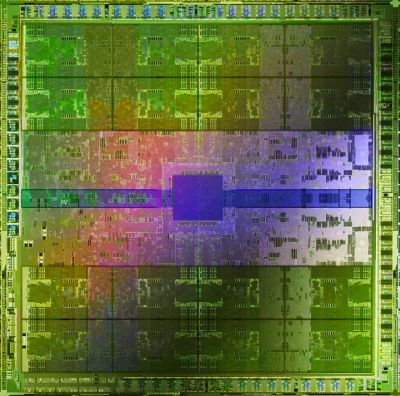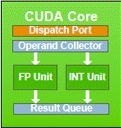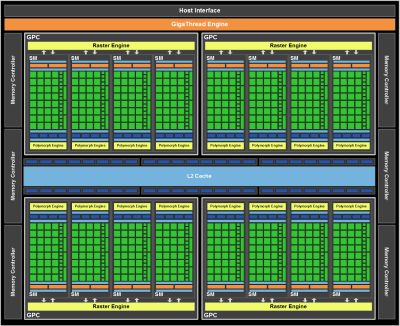[youtube j9F3W-v6PNI]
GT100 tesselation demo
After the first global overview in September 2009, NVIDIA has released new details on its new Fermi GT100 architecture. Here is a summary of NVIDIA’s GT100 architecture features in equations:
- The CUDA core is the primary working unit of the GF100 (Each CUDA core is fully IEEE 754-2008 compliant) – GF100 = 512 CUDA cores
- Streaming Multiprocessor (SM) = 32 CUDA cores – GF100 = 16 SM
- 4 SFU per SM (SFU – Special Function Unit – executes transcendental instructions such as sin, cosine, …) – GF100 = 64 SFUs
- Graphics Processing Cluster (GPC) = 4 SM – GF100 = 4 GPC
- 1 Raster Engine per GPC (raster engine = rasterization, z-culling). A raster engine processes 8 pixels per clock – GF100 = 32 pixels per clock
- 1 PolyMorph Engine per SM (PolyMorph Engine: execution unit that handles geometry for GF100: vertex fetch, tessellation, viewport transform, attribute setup, and stream output) – GF100 = 16 PolyMorph Engines
- 4 Texture Units per SM – GF100 = 48 Texture Units
- 6 partitions of 8 ROPs (ROPs perform blending or AA) – GF100 = 48 ROPs

GT100 die

SM (Streaming Multiprocessor) detail

CUDA core detail
The tessellator of the PolyMorph Engine is THE BIG FEATURE of GT100:
[youtube K3m9rPltA_s]
References:

Sounds like you might need to add tesselation to your furmark program to give those ploymorphs a run for their money…
Yep I’m thinking about that! I’m adding a new feature in FurMark (not yet tesselation)related to tesselation…
I’m so upset cause ATI had tesselator long ago but this was just dead piece of die
Pingback: SHP (smoothed particle hydrodynamics ) « O BALBIO 3D